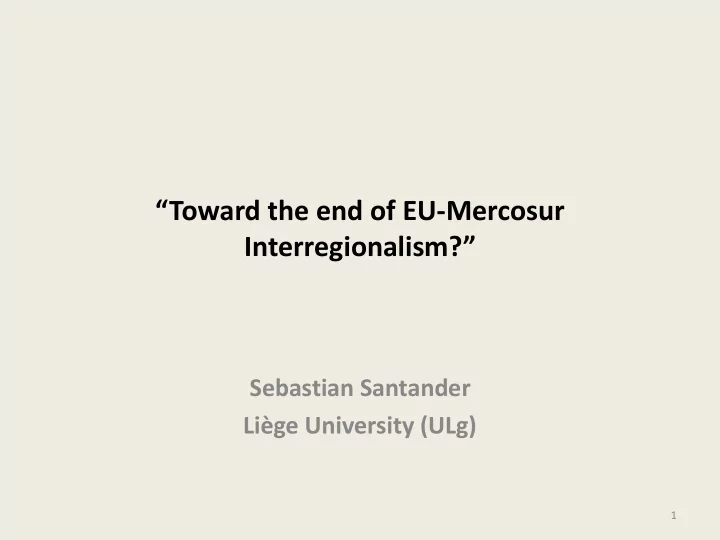

“Toward the end of EU -Mercosur Interregionalism?” Sebastian Santander Liège University (ULg) 1
EU-Mercosur • Relations date back to 1990s • Interacted as regions • The interregional relations covered a wide range of issues: – Democracy – Human rights, – Immigration, – Institutional cooperation – … • The negotiation of interregional FTA 2
Several incentives • Political and economic liberalization in South America • Consolidation of the EU and the will to adopt a comprehensive strategy toward LA • “Open - regionalism” (outward -oriented and compatible with globalisation) • FTAA project • Perceptions: – Mercosur as regional project “similar” to the EU – EU seen as a reference 3
Interregionalism affected by several factors • The failure of the FTAA project affected political will: – EU feared of a Pan-American bloc – Mercosur: EU as a conterweight to the FTAA project • Eastern enlargement – Most East European countries no political interest in LA – Agricultural subsidies extended – Inside the EU: consolidation of a front against an Association Agreement with Mercosur • Increasing concerns of the EP for European agriculture • Impact assessment study financed by the European Commission: – A FTA with Mercosur “may cause a decline in farm income” 4
Political evolution of South America • South America: – Questioning the « Washington consensus » and – moving away from neoliberalism • Measures: – Diversify their economy – Re-launch their industry – Support consumption – To boost internal production: import restriction measures – Nationalizations • Argentina : after 2001, the Argentine State has recovered an important role in the economy 5
Brazil • A lot of concern • Documents showing de-industrialization • Debate has intensified – Government adopted import restrictions 6
Economic priorities less compatible with EU- Mercosur trade agenda • Mercosur countries reluctant to discuss about: – Industry – Investment protection – Government procurement – … 7
The impact of the EU-Brazil partnership • The result of an European initiative • The EU considered the launching of bilateral partnership with Brazil as way: – To boost the integration process of Mercosur – To reinforce EU-Mercosur relations – To conclude the interregional Association agreement • It didn’t fulfill those expectations 8
• Bad climate inside Mercosur • The message ≠ from: – its traditional interregionalist doctrine and – its preference for groups-to-groups dialogue • Undermining EU image as an “external federator” for regionalism 9
Perceptions • South American perceptions: – EU pursues the same strategy as that of the US – Association Agreement with the EU not worth: • Economic model • EU perceptions: – Mercosur not inspired by the EU integration project – EU disappointed by Mercosur 10
Recommend
More recommend